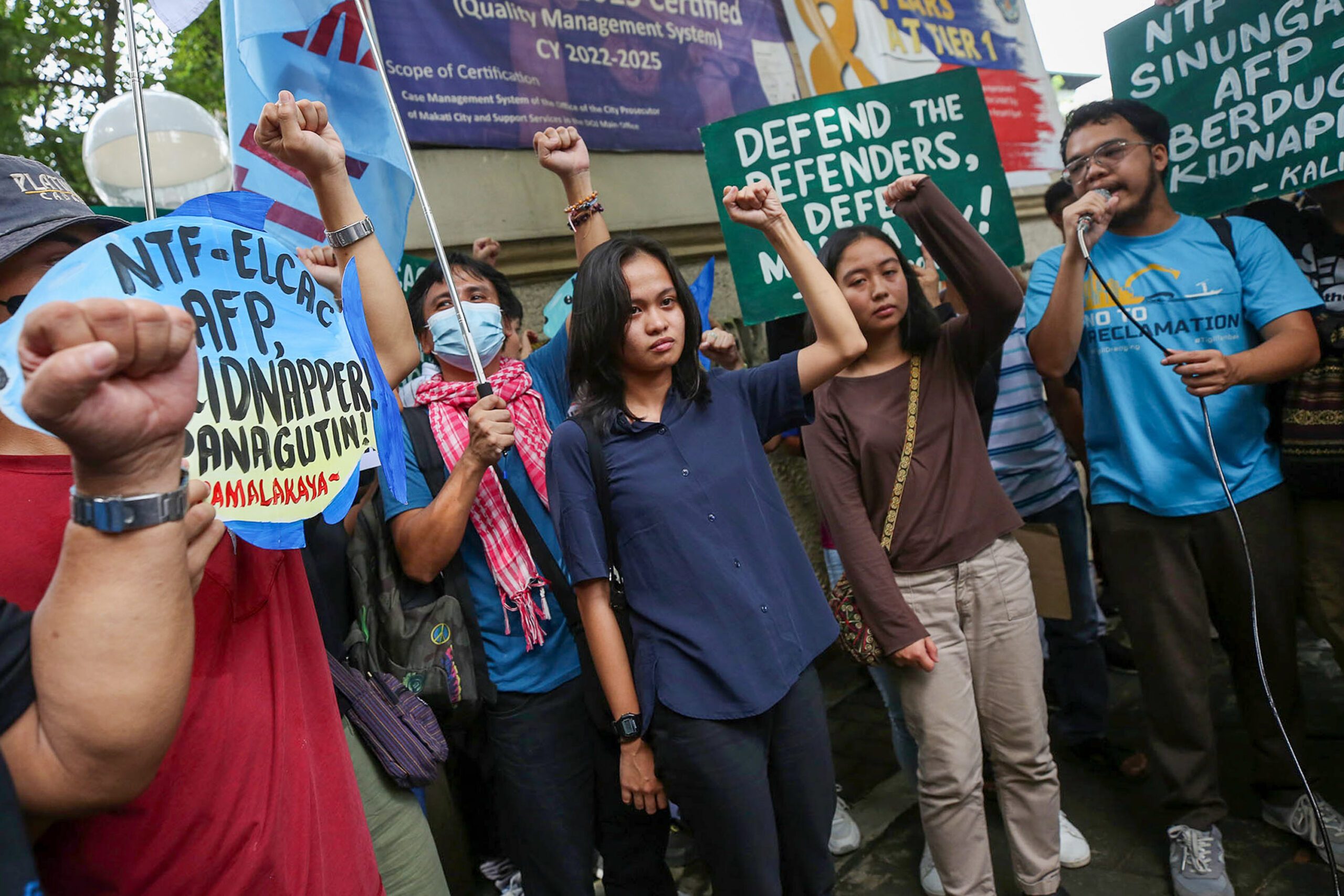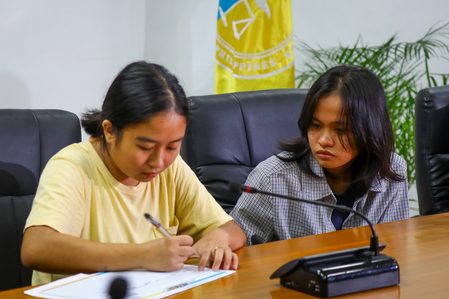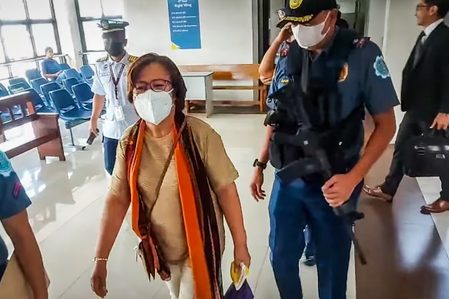SUMMARY
This is AI generated summarization, which may have errors. For context, always refer to the full article.

It seems the fight for temporary protection is not yet over for young environmental activists Jonila Castro and Jhed Tamano.
Solicitor General Menardo Guevarra, in a very urgent omnibus motion dated February 19, asked the Supreme Court (SC) to recall the temporary protection order granted to the two activists who were allegedly abducted by the military. The SC recently granted the protective writs sought by the two.

The High Court, on February 15, said the SC magistrates granted the writs of amparo and habeas data petitions filed by Castro and Tamano, and issued a temporary protection order for them. A writ of amparo is a legal remedy to protect one’s security or life, and usually comes in the form of a protection order. The writ of habeas data, meanwhile, compels the government to destroy information that could cause harm to a person.
With the issuance of the temporary protection order, the SC prohibited the respondents in the writs – who were mostly law enforcers – “from entering within a radius of one kilometer from the persons, places of residence, school, work, or present locations, of petitioners, as well as those of their immediate families.”
Guevarra, whose office serves as the primary legal counsel of the government, said the SC decision granting the writ “poses irreversible complications in the time-honored principle of due process, judicial efficiency, and the very core of law which, if not revisited, will result to severe consequences.”
The issuance of the temporary protection order posed two challenges in the ongoing grave oral defamation case against Castro and Tamano, according to Guevarra. First, maintaining law enforcement in specific zones, and second, serving the warrant against the two.
The two activists were slapped with the charge and were ordered arrested by a Bulacan court over the charge filed by Lieutenant Colonel Ronnel dela Cruz of the Philippine Army. The Department of Justice prosecutors indicted Castro and Tamano for slander or grave oral defamation for “embarrassing and putting [the Armed Forces of the Philippines] in bad light.”
On Wednesday, February 21, the two activists each posted the required bail of P18,000. The court also set the arraignment and pre-trial for the case on March 15, at 8:30 am.
Clarifications on writ of amparo
The motion sought clarifications in the proceedings for the writ of amparo.
Guevarra argued that the determination of substantial evidence is usually done after a hearing, based on the comprehensive review of all evidence presented. In granting the writ, the SC said the petitioners (Castro and Tamano) presented more than substantial evidence that merited the protection of the petitioners’ freedom.
“The Honorable Court’s initial determination that the Petitioners’ evidence surpasses the threshold of substantial evidence, before the conduct of the summary hearing, inevitably undermines the Court of Appeals’ independent assessment of the sufficiency of evidence in its determination of the propriety of granting the privilege of the writs. Such early pronouncement certainly prejudiced Respondents’ right to due process,” the motion read.
The issuance of the writ can be done by a court if, on the face of the petition, that court finds it necessary to grant it. The issuance of the writ, which is part of the initial steps in the process, orders the conduct of the summary hearing that will be held by the Court of Appeals.
The SC, in Castro and Tamano’s case, granted only the writ, and not the privilege. The privilege of the writ “includes availment of the entire procedure outlined in AM No. 07-9-12-SC, the Rule on the Writ of Amparo.”
In the Castro and Tamano decision, the SC directed the CA to conduct a summary hearing that will determine if the privilege of the writ will be granted, and if a permanent protection order will be granted in favor of the respondents.
Due process
Guevarra, in the motion, also noted there was “failure to afford respondents due process.” The claim pointed that the decision in granting the writ only relied on the narratives of the petitioners.
“The Decision’s reliance on the Petitioners’ narrative, supplemented by selective media reports, without a corresponding and rigorous scrutiny of the Respondents’ submissions, presents infidelity to due process concept, reinforced in a number of impressive jurisprudence,” the motion said.
In the procedures on amparo petitions, the court usually directs the respondents to submit a return, which is a document that contains the respondents’ defense and the steps and actions taken by them, among others. Section 9 of the Rule in the Writ of Amparo states that “within seventy-two (72) hours after service of the writ, the respondent shall file a verified written return together with supporting affidavits.”
Section 10 of the same rule mandates that all defenses shall be raised in the returns that will be submitted, “otherwise they shall be deemed waived.”
Not the first time
This is not the first time that Guevarra has challenged an order or decision favoring activists or progressive individuals.
In October last year, the OSG challenged the acquittal of journalist Lady Ann Salem and trade unionist Rodrigo Esparago before the SC. Guevarra asked the SC to nullify the past two decisions of the CA that affirmed the acquittal of Salem and Esparago.
Salem and Esparago, along with five other activists, were arrested on December 10, 2020, during a celebration of International Human Rights Day. In February 2021, Mandaluyong RTC Branch 209 Judge Monique Quisumbing-Ignacio cleared them of the charges of illegal possession of firearms and explosives. The CA agreed with the local court and upheld their acquittal.
When former senator Leila de Lima secured her second acquittal in one of her drug charges in 2023, the OSG also challenged the decision. The OSG petition came after Muntinlupa City Regional Trial Court Branch 204 affirmed its decision to acquit De Lima, and denied the prosecution’s motion for reconsideration. – Rappler.com
1 comment
How does this make you feel?













Noted: “The Department of Justice prosecutors indicted Castro and Tamano for slander or grave oral defamation for ’embarrassing and putting [the Armed Forces of the Philippines] in bad light.'” This is true. But what if the causes of such embarrassment are looked over? There are two, namely: 1) immediate – the action of the activists; 2) principal – the action of an officer who is influenced by a “gunpowder-filled brain.” While the action of the activists was the immediate cause, the principal cause should also be looked into. But the latter action will more likely NOT happen under the present kind of military establishment.